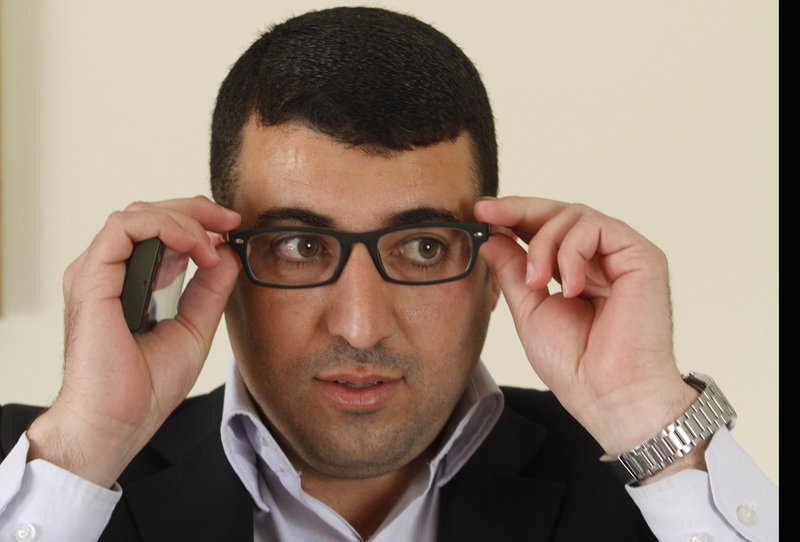HUSSAN, West Bank – Mahmoud Abbas’ government in the West Bank is getting tougher with critics, interrogating, prosecuting and even jailing several journalists and bloggers in recent months for allegedly “defaming” the Western-backed Palestinian leader.
Rights activists say the legal hassles are meant to silence dissent and that the campaign is intensifying despite promises to the contrary by Abbas.
Targets of the crackdown include supporters of the Islamic militant Hamas and political independents who have written about alleged nepotism and abuse of power in Abbas’ Palestinian Authority.
Abbas’ aides insist the Palestinian leader opposes any curb on expression. They blame overzealous prosecutors and security officials, but government critics say Abbas could easily halt the clampdown.
“It’s a good cop, bad cop routine. The bad cops are the security services, and the good cop is the benevolent president,” said Diana Buttu, a former Palestinian Authority insider. They want to send a chilling message, she said, “and it works.”
Abbas’ foreign backers, who view him as key to delivering any future peace deal with Israel and maintaining quiet in the West Bank, have said little in public about the issue. Instead, during a visit to the West Bank in late March, President Obama showered Abbas and his security forces with praise for their efforts to prevent militant attacks on Israel.
There have been waves of crackdowns on political rivals, particularly Hamas, since the Palestinian Authority was established two decades ago, as part of interim peace deals with Israel. However, Palestinian journalists say they are increasingly being targeted.
“I think it is getting worse, although we are getting very rosy promises” from the president’s office, said Nabhan Khraishi, a spokesman for the Palestinian Journalists’ Syndicate, a union with hundreds of members.
Ahead of Obama’s meeting with Abbas, 18 Palestinian journalists were told that they would not be allowed to enter the president’s compound to cover the event. Veteran reporters were among those denied accreditation, apparently for being perceived as politically hostile to the Palestinian Authority.
Khraishi said that in talks with the journalists’ union, political advisers and security officials blamed each other for banning journalists from covering Obama.
Two recent court rulings have drawn more attention to the clampdown on free speech.
• On Thursday, an appeals court in the West Bank upheld a one-year prison term for Mamdooh Hamamreh for “defaming” Abbas. Hamamreh allegedly posted a photo montage on his Facebook page in September 2010 that showed Abbas next to a TV villain. A caption read: “They’re alike in all ways.” The villain in the TV drama collaborated with French colonial rule in Syria.
Hamamreh, a Hamas activist in his college years, denies having posted the photos. He said he spent 53 days in interrogation, missing the birth of his son, and was banned from seeing his lawyer for the first 20 days.
After his release on bail, his trial and an appeal dragged on for more than two years. Abbas pardoned him hours after the appeals court decision Thursday, and Hamamreh was released later that day.
Hamamreh said he believes the main point was to deter him and others from speaking out, and that he will stay clear of any potential trouble in his work.
“I now censor myself regarding anything I say,” the 29-year-old said Saturday, surrounded by well-wishers at his family home in the village of Hussan, near Bethlehem. “It’s the one thing they (the authorities) succeeded in doing, which is intimidation.”
• On the same day as Hamamreh’s verdict, another court in the northern town of Salfit sentenced a blogger, Anas Ismail, to six months for “liking” three Facebook posts critical of the Ministry of Telecommunications and the minister himself.
Ismail, 30, said he was jailed for 17 days of interrogation in February and convicted and sentenced Thursday for “insulting a minister.” The judge allowed him to appeal immediately, meaning he is staying out of prison for now.
He later posted on his Facebook page: “For a ‘tag,’ you get one year. For a ‘like,’ you get six months, for a ‘share’ you get a suspended sentence. A comment invites the biggest disaster.”
Send questions/comments to the editors.



Success. Please wait for the page to reload. If the page does not reload within 5 seconds, please refresh the page.
Enter your email and password to access comments.
Hi, to comment on stories you must . This profile is in addition to your subscription and website login.
Already have a commenting profile? .
Invalid username/password.
Please check your email to confirm and complete your registration.
Only subscribers are eligible to post comments. Please subscribe or login first for digital access. Here’s why.
Use the form below to reset your password. When you've submitted your account email, we will send an email with a reset code.